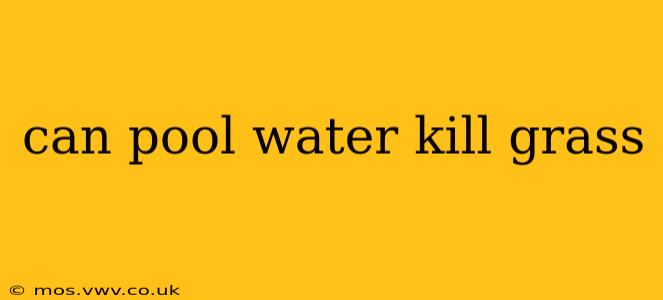Can Pool Water Kill Grass? Understanding the Impact of Chlorinated Water on Your Lawn
The short answer is: yes, pool water can kill grass, but it's not always a guaranteed outcome. The damage depends on several factors, including the concentration of chlorine, the frequency of exposure, and the type of grass. Understanding these factors is crucial to protecting your lawn.
This article will delve into the reasons why pool water can harm your grass, explore the different ways it can impact your lawn, and offer solutions to mitigate the damage.
How Does Pool Water Damage Grass?
The primary culprit is chlorine. While essential for keeping your pool clean and safe, high concentrations of chlorine are highly toxic to plants. When pool water spills onto your lawn, the chlorine disrupts the grass's cellular processes, leading to:
- Chlorosis: This is a yellowing of the grass blades, indicating damage to the chlorophyll responsible for photosynthesis.
- Necrosis: This is the death of plant tissue, resulting in brown patches and potentially the complete death of the affected area.
- Root damage: Chlorine can penetrate the soil and damage the grass roots, making it difficult for the grass to absorb water and nutrients. This damage can be long-lasting and lead to thinning or bare patches.
What Factors Influence the Damage?
Several factors influence how much damage pool water does to your grass:
- Chlorine Concentration: Higher chlorine levels cause more significant damage. Regular pool maintenance should keep chlorine levels within a safe range, but accidental spills or leaks can concentrate the chemical, leading to more severe damage.
- Frequency of Exposure: Occasional spills are less likely to cause serious problems than repeated or prolonged exposure. Regular watering with pool water, even diluted, can cumulatively harm your lawn.
- Type of Grass: Some grasses are more tolerant of chlorine than others. For example, tougher grasses like Bermuda or Zoysia may withstand more exposure than more delicate varieties like Fescue.
- Soil Type: Well-drained soil might help dilute the chlorine more quickly, reducing the harm to the grass roots. Clay soils, which retain water, might hold the chlorine longer, increasing the risk of damage.
- Amount of water: A small spill will likely have less impact than a large amount of pool water.
What Happens if Pool Water Gets on My Grass?
The immediate effects might not be visible. However, over time, you'll notice yellowing or browning of the grass in the affected area. In severe cases, the grass might die completely. The damage might not be immediately apparent, with symptoms appearing days or even weeks after exposure.
How Can I Protect My Grass From Pool Water?
Prevention is key. Here are several steps to take to minimize the risk of damaging your lawn:
- Regular Pool Maintenance: Maintain proper chlorine levels in your pool to avoid accidental spills with high concentrations.
- Careful Pool Cleaning: Prevent spills during cleaning by using appropriate techniques and equipment.
- Prompt Cleanup: If a spill occurs, immediately flush the affected area with clean water to dilute the chlorine.
- Landscaping: Consider strategic landscaping to create a barrier between the pool and your lawn.
- Use a different water source: For watering your lawn, use municipal water or collected rainwater instead of pool water.
Can I use pool water to water my plants?
While some plants might tolerate diluted pool water in small amounts, it's generally not recommended. The chlorine and other chemicals in pool water can harm most plants and are best avoided.
Is there a way to revive grass damaged by pool water?
If the damage is minor, flushing the area with plenty of clean water and allowing the grass to recover naturally is often sufficient. For more severe damage, you might need to re-seed or re-sod the affected area. In any case, providing proper care like fertilization and watering will help the lawn recover.
By understanding the risks and taking preventative measures, you can keep your lawn healthy and vibrant, even with a pool in your backyard. Regular maintenance and careful attention to detail can go a long way in preventing damage from pool water.
